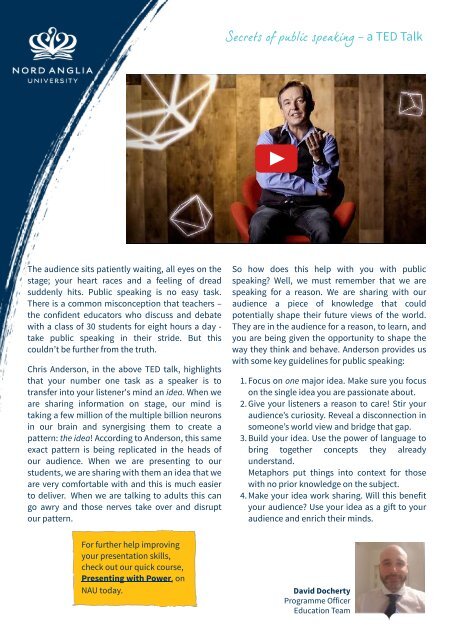Connect-ed+Issue+46+January+2019
Create successful ePaper yourself
Turn your PDF publications into a flip-book with our unique Google optimized e-Paper software.
Secrets of public speaking ? a TED Talk<br />
The audience sits patiently waiting, all eyes on the<br />
stage; your heart races and a feeling of dread<br />
suddenly hits. Public speaking is no easy task.<br />
There is a common misconception that teachers ?<br />
the confident educators who discuss and debate<br />
with a class of 30 students for eight hours a day -<br />
take public speaking in their stride. But this<br />
couldn?t be further from the truth.<br />
Chris Anderson, in the above TED talk, highlights<br />
that your number one task as a speaker is to<br />
transfer into your listener's mind an idea. When we<br />
are sharing information on stage, our mind is<br />
taking a few million of the multiple billion neurons<br />
in our brain and synergising them to create a<br />
pattern: the idea! According to Anderson, this same<br />
exact pattern is being replicated in the heads of<br />
our audience. When we are presenting to our<br />
students, we are sharing with them an idea that we<br />
are very comfortable with and this is much easier<br />
to deliver. When we are talking to adults this can<br />
go awry and those nerves take over and disrupt<br />
our pattern.<br />
So how does this help with you with public<br />
speaking? Well, we must remember that we are<br />
speaking for a reason. We are sharing with our<br />
audience a piece of knowledge that could<br />
potentially shape their future views of the world.<br />
They are in the audience for a reason, to learn, and<br />
you are being given the opportunity to shape the<br />
way they think and behave. Anderson provides us<br />
with some key guidelines for public speaking:<br />
1.Focus on one major idea. Make sure you focus<br />
on the single idea you are passionate about.<br />
2.Give your listeners a reason to care! Stir your<br />
audience?s curiosity. Reveal a disconnection in<br />
someone?s world view and bridge that gap.<br />
3.Build your idea. Use the power of language to<br />
bring together concepts they already<br />
understand.<br />
Metaphors put things into context for those<br />
with no prior knowledge on the subject.<br />
4.Make your idea work sharing. Will this benefit<br />
your audience? Use your idea as a gift to your<br />
audience and enrich their minds.<br />
For further help improving<br />
your presentation skills,<br />
check out our quick course,<br />
Presenting with Power, on<br />
NAU today.<br />
David Docherty<br />
Programme Officer<br />
Education Team


